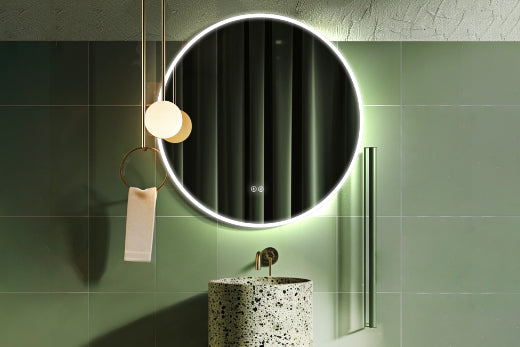Mirrors have long been more than just practical household objects. Across various cultures and time periods, they have held significant symbolic and spiritual meaning. From ancient beliefs about their mystical properties to their modern decorative uses, mirrors continue to captivate human imagination.
In this blog, we will explore the symbolism of mirrors, how different cultures incorporate them into their lives, and how they have evolved into popular decorative elements in today’s homes.
The Symbolism of Mirrors
Mirrors symbolize much more than mere reflection; they are often seen as gateways to truth, self-awareness, and sometimes, even spiritual realms. In many cultures, mirrors represent introspection and a deep connection to one’s inner self. They are also tied to notions of beauty and identity, where seeing one’s reflection evokes thoughts of self-worth and personal aesthetics. Conversely, mirrors have sometimes been viewed with suspicion, associated with vanity or deception, symbolizing the conflict between appearance and reality.
Mirrors in Ancient Egypt
In ancient Egypt, mirrors were considered sacred objects often associated with the goddess Hathor, who represented beauty, love, and fertility. Egyptians believed that mirrors reflected not just the physical body but also the soul. Handheld mirrors, often crafted from polished copper or bronze, were treasured items used in both personal grooming and religious rituals. They were often placed in tombs as a symbol of eternal beauty in the afterlife, highlighting their cultural significance beyond the physical world.
Mirrors in Chinese Culture
In Chinese culture, mirrors hold significant importance in both daily life and traditional practices such as Feng Shui. They are believed to reflect and ward off negative energy or “Sha Qi,” helping to harmonize the energy flow within a space. Placing mirrors strategically in homes and offices can bring balance, luck, and prosperity. Moreover, ancient Chinese folklore considered mirrors to have magical powers, capable of revealing true spirits and warding off evil beings by reflecting their true nature.
Mirrors in Western Culture
Mirrors in Western culture have long been associated with the idea of vanity and self-reflection. In Renaissance art, mirrors often symbolized self-awareness or moral scrutiny. Paintings from this era frequently depicted mirrors alongside women, hinting at themes of vanity or introspection. In fairy tales and literature, such as the famous “Snow White” tale, mirrors were used as magical devices that revealed hidden truths or desires.
In more contemporary times, mirrors are widely used as decorative elements in Western homes. Their ability to open up a space and create an illusion of depth makes them essential in modern interior design. Large, framed mirrors, especially those with LED lighting or unique shapes like oval, round, or arch mirrors, have become popular for creating focal points in homes, adding both style and functionality.
Mirrors in Japanese Culture
In Japan, mirrors are deeply tied to Shinto beliefs, where they are revered as sacred objects that house divine spirits. One of Japan's most treasured relics, the Yata no Kagami, is a sacred mirror that is part of the Imperial Regalia of Japan, symbolizing wisdom and honesty. Mirrors are often used in Shinto shrines to reflect the image of worshippers and the divine, signifying the presence of kami, or spirits, within the reflection. Japanese culture also associates mirrors with introspection and self-discipline, reflecting the values of honesty and purity.
Mirrors in Indian Culture
In Indian culture, mirrors are frequently used in spiritual practices and rituals. They are seen as instruments for self-reflection, both in a literal and spiritual sense. In some traditional Indian homes, mirrors are placed at the entrance to ward off negative energy, reflecting it away from the household. Mirrors are also commonly used during festivals, such as Diwali, to enhance the lighting and create a sense of expansiveness in homes. In Indian weddings, mirrors symbolize the beauty and purity of the bride, as well as the union of two souls.
Modern Era: Mirrors as Decorative Elements
In the modern era, mirrors have become indispensable elements in interior design, used primarily for their aesthetic appeal. While their historical and symbolic significance remains, today’s homeowners and designers often incorporate mirrors to enhance the visual appeal of spaces. Mirrors are used to create the illusion of a larger room, reflect natural light to brighten interiors, and serve as striking focal points in hallways, bedrooms, and living rooms.
Contemporary mirrors come in various shapes, sizes, and designs, from minimalist frameless mirrors to ornate, framed ones.
For instance, round mirrors have become trendy for their soft, inviting shape, while oversized rectangular mirrors are used to make bold style statements. Mirrors with additional features like LED lighting, anti-fog capabilities, or metallic frames add a modern touch to any space.
Mirrors as a Universal Symbol
Despite the cultural variations, mirrors universally symbolize self-awareness, beauty, and spirituality. Whether used for warding off negative energy in Feng Shui, spiritual reflection in Japan, or as a symbol of eternal beauty in ancient Egypt, mirrors continue to hold significant importance across the world. They serve both practical and aesthetic purposes, reflecting light and opening up spaces while also offering deeper meaning and insight into one’s soul and surroundings.
Conclusion
At Hoko Style, we celebrate the timeless appeal of mirrors across cultures. Our collection of mirrors, from oval to round and arch-shaped designs, combines cultural significance with modern style. Whether you’re looking for a piece to enhance your space or seeking to embrace the spiritual symbolism of mirrors, we offer a range of designs that blend tradition and innovation.
Mirrors are not just objects for reflection but symbols deeply rooted in cultural beliefs and practices. Their use across different cultures reflects humanity’s fascination with identity, beauty, and the spiritual world. In the modern era, mirrors have become essential elements in interior design, valued for their ability to enhance spaces and create elegant, visually appealing environments. Explore the significance of mirrors in your own space with Hoko Style’s exclusive collection, designed to inspire and elevate your home.

 Alle Filter
Alle Filter

